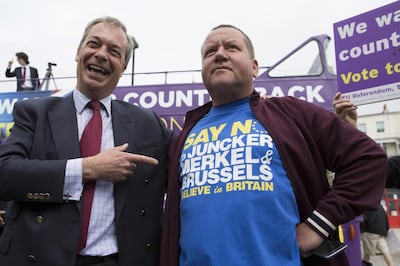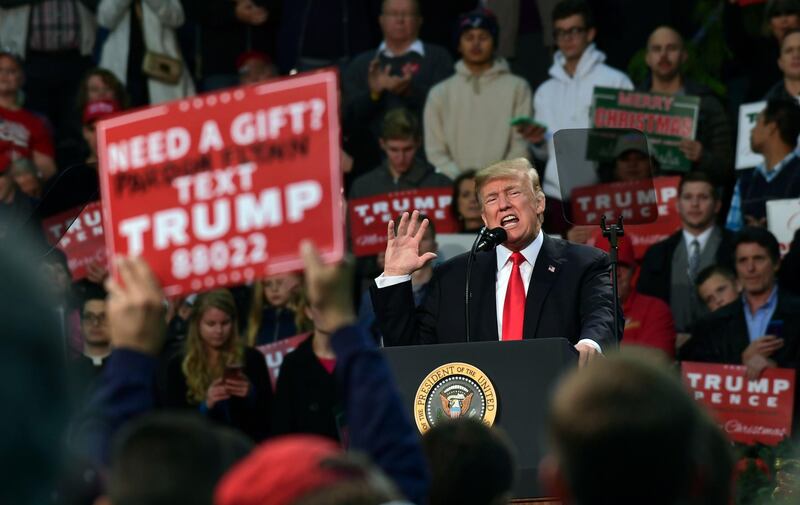Worldwide, 2017 was the Year of Populism but there were as many setbacks as gains for rabble-rousers. It is fair to ask if it was the year that the trend peaked.
Donald Trump is the Populist-in-Chief. Throughout 2017 he attacked the American media, the FBI, Congress, his own Republican Party leadership, the US court system, judges, American football teams and their league, the NFL, the Democrats, Hillary Clinton, numerous friendly foreign countries, from Australia and Japan to Germany and the UK, and many other institutions. He claimed the FBI’s reputation was “in tatters.” (It isn’t.) He said he believes former KGB Colonel Vladimir Putin’s denials of Russian interference in the US presidential election. (He shouldn’t.) This meant the president directly contradicted the finest intelligence experts in the world — his own, including the CIA. But, beyond his abusive attacks to destabilise institutions, voters are beginning to wonder what the world’s most powerful populist actually achieved. Not much.
The Trump presidency in 2017 was all sizzle and no steak.
_______________
Read more:
Capitalism is not working, but can it be fixed?
The quest for a 'United States of Europe' exemplifies the EU elite's contempt for people's wishes
_______________
As a Republican president with a Republican Senate and a Republican House of Representatives, Mr Trump’s party controls all the levers of power, yet he failed to repeal Obamacare, failed to Build a Wall and make Mexico pay for it, and failed to consolidate American leadership. His one significant legislative victory has been to unite the Republican Party to push for tax cuts — an achievement rather like uniting horses to eat grass or fish to swim in the sea. Tax cuts are what Republicans do.
Mr Trump has already suffered the extraordinary setback of seeing Roy Moore, the Republican candidate in a special Senate election in Alabama — a solid Republican state — being comprehensively defeated by the Democrat, Doug Jones. Mr Moore faced allegations amounting to paedophilia, racism, religious bigotry and anti-semitism, and yet he retained Mr Trump’s backing. When a black voter asked about the Trump slogan “Make America Great Again” Roy Moore said America was great at the time of slavery “when families were united — even though we had slavery — they cared for one another.” Moore’s resounding defeat means Republican grip on the US Senate now looks shaky.

And 2018 could be even more difficult. Next November the entire House of Representatives and a third of the US Senate face re-election. Mainstream Republicans fear that the closer they get to their unpopular president, the more likely they may lose their seats. The key question for American populism in 2018 is whether mainstream Republicans recognise that their president is no longer Disruptive Donald, but in fact Toxic Trump.
If Mr Trump looks like a loser, his ability to turn policies into law will evaporate, and his presidency in 2018 may Tweet itself into irrelevance.
In Europe, right up to the end of 2017, anti-immigrant populists continued to feed on resentment and anger. The far right Alternativ für Deutschland party polled well in September’s German elections. After an internal power struggle in December the hardcore anti-foreigner faction of AfD expanded their control of the party. The far right polled strongly in Austria too and in November 2017 in Warsaw, 60,000 demonstrators marched to demand a “pure Poland,” a “white Europe of brotherly nations” and “Clean Blood.”
In December a man nicknamed “the Czech Donald Trump” was sworn in as prime minister of his country. Andrej Babis is 63 and his personal wealth is put at several billion dollars. His appeal to Czech voters was based on the familiar populist cocktail of strongly anti-EU rhetoric, opposition to the euro and a hard line against immigration. Like President Trump, Prime Minister Babis wants to use business principles to run his country. And like Mr Trump, and other populists including President Duterte in the Philippines or Silvio Berlusconi in Italy, Mr Babis promises to shake up the old order and discredited “elites” in the name of “the people.” Talking of Mr Berlusconi, the Italian saw his populist party make a comeback in Sicily’s 2017 elections by reflecting the profound resentment many Italians feel about being in the frontline of migration from North Africa.

Elsewhere in the world a recent article in Foreign Policy magazine suggests the world is “sleepwalking” into a new populist surge, especially in Latin America, where the magazine predicts “the most consequential regional political realignment in a generation.” In a slew of upcoming elections, Latin American populists from the far Right to far Left are predicted to do well in 2018.
There are signs that the populist wave could be renewed in 2018 because the sense of resentment which drove popular discontent is based on three grievances which have not been fixed: declining living standards, the dislocation caused by globalisation, and migration.
Economists predict a continuing economic upturn, but even so, voter anger about unfairness and inequality will undoubtedly continue in 2018. And even if Syria and Afghanistan were somehow to become more stable, waves of migrants from other poor countries will not cease. For hundreds of millions of desperate people, Europe in 2018 will remain the land of opportunity, and so will the United States. All through Latin America, hopeful migrants will continue to trek north while Donald Trump’s populist slogan of “building a wall” on the Mexican border remains just that — a slogan.
Balanced against this are important reasons why populism may yet decline in 2018. At the World Forum for Democracy conference in December.
Canada’s special envoy Stephane Dion pointed out that populists gain power by attacking the institutions of “liberal democracy,” claiming those institutions have failed. Their solution is instead “illiberal democracy.” Populist leaders, in other words, tend to be authoritarian supposed “strongmen” who promise to stamp on the dithering bureaucrats who fail to make democratic institutions work properly.
Modern democratic government is nothing like running a business. A CEO can order employees to do things. But in a democracy, voters are not employees. They are employers. They hire and fire presidents and prime ministers. And voters expect much more than bluster and Twitter. Typically they demand achievements, consistency and team building. Mr Trump has failed on all counts. His first year has seen as many press secretaries come and go as some presidents require in their entire term in office. Advisers are thrown overboard when they prove inconvenient. Posts remain unfilled. Talented Republicans refuse to commit to serving a president who demands loyalty from others but does not demonstrate it even towards his own key staff.

In Britain too, populist slogans have failed to turn into reality. During the 2016 Brexit campaign and again in 2017, British voters heard politicians, including Foreign Secretary Boris Johnson, assert that Brexit would bring £350 million a week back to the UK’s National Health Service. Wonderful trade deals with major countries were said to be on the cards. Freeing Britain from the EU bureaucracy would be cheap and easy. Britain would, as Mr Johnson put it, “have our cake and eat it” while the EU could “go whistle” if they expect the UK to pay a big divorce bill. But the cake, like the rhetoric, is stale. The agreed bill appears now around £40 billion, and 2018 looks like being even rougher. Those who want the UK to Remain in the EU are already aggrieved at what they see as lies and incompetence. Those who voted to Leave complain that they are being “betrayed” by “saboteurs” and “enemies of the people” from among the “elite.” In 2018 both Leave and Remain voters may be increasingly disappointed, increasingly angry and the British government itself might even fall.
Elsewhere, simplistic populist solutions to complex problems have also failed. In the Philippines Mr Duterte’s idea of shooting drug dealers has, as far as we know, failed to turn into anything more than a slogan.
In Italy Virginia Raggi, of the insurgent populist Five Star Movement, became Mayor of Rome promising a fresh start for an ancient capital, but immediately she ran into the usual boring problems of running a vast city, including rubbish collection, despondent public service workers, crime, croneyism, traffic, and pollution. Breaking the mould of politics is difficult if you cannot keep the streets clean and safe.
And so the fate of populism in 2018 depends on a number of factors. The widespread loathing of big institutions and supposed “elites”, from the European Union to Wall Street and the Washington bureaucracy, will continue. So will resentment about migration and economic unfairness. But the appeal of populism will be undermined by the continuing failure of populists in power. And that raises another big question. If those who offered something fresh and new in 2016 and 2017 - Trump, Brexit, Macron, Babis, Berlusconi, AfD, and others - fail to change the lives of angry voters for the better, where will all that anger, disillusionment and discontent find a home in 2018? Might traditional parties reinvent themselves?
Might a message of healing the wounds of division win through? Possibly. But, like failing gamblers, populist leaders may also raise the stakes to counter their unpopularity. Leaders who fail to solve problems at home sometimes take risks in starting conflicts abroad. We can only hope that even the most reckless populist leader in 2018 recognises the futility of stirring up patriotic sentiments through the ultimate populist gamble — taking a nation into war.







